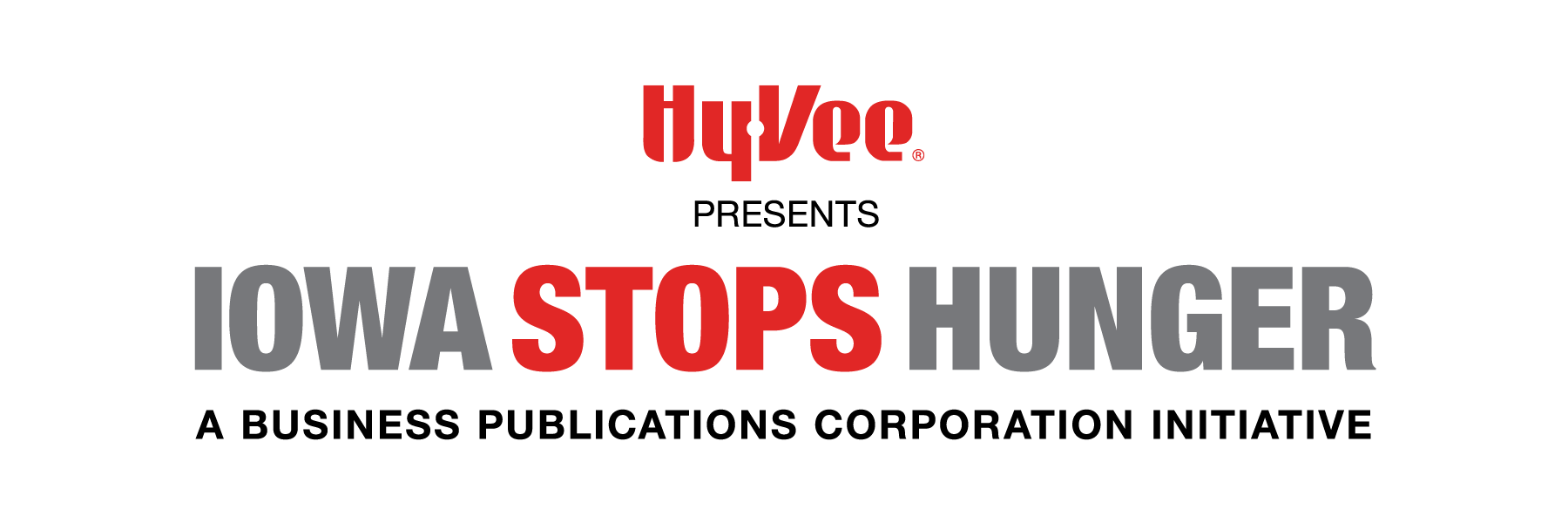What business leaders can do to fight food insecurity
BY MICHAEL CRUMB
Business Publications Corp. will showcase another year of its Iowa Stops Hunger Initiative on Aug. 30 with a virtual event and the publication of its annual Iowa Stops Hunger magazine later this fall.
BPC and its publications, including the Business Record, dsm magazine and ia magazine, began Iowa Stops Hunger in 2020 as the number of people experiencing food insecurity increased during the early months of the coronavirus pandemic. The goal was to bring attention to those who are food insecure and to shed light on those who have made it their mission to help.
Now, two years later, food insecurity has surged as inflation rose and prices of food and fuel soared. That created an added burden to SNAP recipients who saw their benefits reduced earlier this year. The benefits were increased during the early days of the pandemic, only to be reduced on April 1 as inflation was reaching its highest levels in more than 40 years.
Those factors combined to cause a surge in the number of people seeking help through the Food Bank of Iowa’s 55-county network in June, when 135,300 individuals and 48,262 households were served. The previous record was in May, when 121,714 individuals were served.
BPC’s Aug. 30 event, Iowa Business Leaders Making a Difference, will feature a panel of speakers who will discuss what the business community can do to address food insecurity and make a difference in their community.
Ahead of the event, we asked the scheduled panelists to answer the question: “What is one thing a business can do to address food insecurity?” Here are their answers.
Rona Berinobis, vice president of corporate responsibility and organizational development, Athene USA
At Athene, human services and health and well-being are two of our four philanthropic pillars. Under these pillars we strive to support our community by providing resources for the underserved and bolster healthy lifestyles. We partner with the Food Bank of Iowa to support distribution of backpacks through the backpack program and culturally responsive food through multiple pantries in their 55-county service area.
Through the backpack program children are provided with cereal, 100% juice, shelf-stable milk, granola bars, canned pasta meals and fruit cups. This program is provided at no cost to schools and families. Children throughout the service area were provided food in their homes over the weekend, giving them nourishment to be prepared for school on Monday through this program. This past year over 48,000 pounds of food was distributed through the backpack program.
The culturally responsive food program is another effort we are proud to support. Taking into account the specific, diverse needs within the service area, it distributed over 39,000 pounds of masa flour – a staple in ethnic communities.
Sharon Krause, board member for In Harmony Farm and owner of Dalla Terra Ranch
At In Harmony Farm, we work directly with socially disadvantaged Iowans (primarily immigrants and refugees) whose goal is to build sustainable farm businesses so they can feed their families and their communities while creating financial independence.
Our program bridges the gap between successful urban gardening and small-scale, specialty crop farming. Farmers receive access to 3 to 5 acres of land, instruction that builds climate-smart farming skills, technical assistance to support business development, and an opportunity to scale production gradually. We connect them with food assistance partners, including the Food Bank of Iowa and DMARC, to explore a market that offers financial return for the farmers while delivering high-quality, fresh, healthy produce, including culturally diverse choices, to low-income communities.
The farmers also market their produce through the Global Greens Farmers’ Market, which participates in the Double Up Food Bucks program; for every $1 spent on fresh fruits and vegetables, participants receive $1 in Double Up Food Bucks, essentially doubling their buying power and promoting healthy eating.
Leah Rodenberg, senior program manager, Alliant Energy
Fighting hunger is one of Alliant Energy’s core giving pillars. Each year, the company supports numerous nonprofits focused on combating food insecurity among children, families and seniors in Iowa through its giving programs and employee engagement.
Since 2007, Alliant Energy has worked to end hunger through a signature event called Drive Out Hunger. Each fall, they invite their company’s business partners from across the country to participate in a golf event with all proceeds directed to seven Feeding America Food Banks that serve their customers and communities in Iowa and Wisconsin.
In the past 15 years, the Alliant Energy Foundation has raised over $5 million and provided over 17 million meals to those in need through this event. They anticipate raising $400,000 at this year’s event on Sept. 13. The funds are utilized by the Food Banks to support mobile food distributions, school backpacks and pantry programs.
Nate Clark, global director of corporate social responsibility at John Deere and president of the John Deere Foundation
The most effective way the John Deere Foundation contributes to ending hunger is by providing food banks with unrestricted funding. The people who work at food banks are our community’s foremost experts on collecting and distributing food to those experiencing hunger. By providing these experts with resources they can use freely to enhance their work through capacity-building, agency outreach, program innovations, and talent attraction, development, and retention, we have seen food banks become an even more effective institution vital to the sustainable well-being of our communities.
We’ve seen time and again how food banks deploy unrestricted funds to not only increase the food they collect and distribute, but also distribute food and other resources in ways that provide greater equity, dignity and prosperity to the people they serve.
To register for the event, visit iowastopshunger.com/events.




